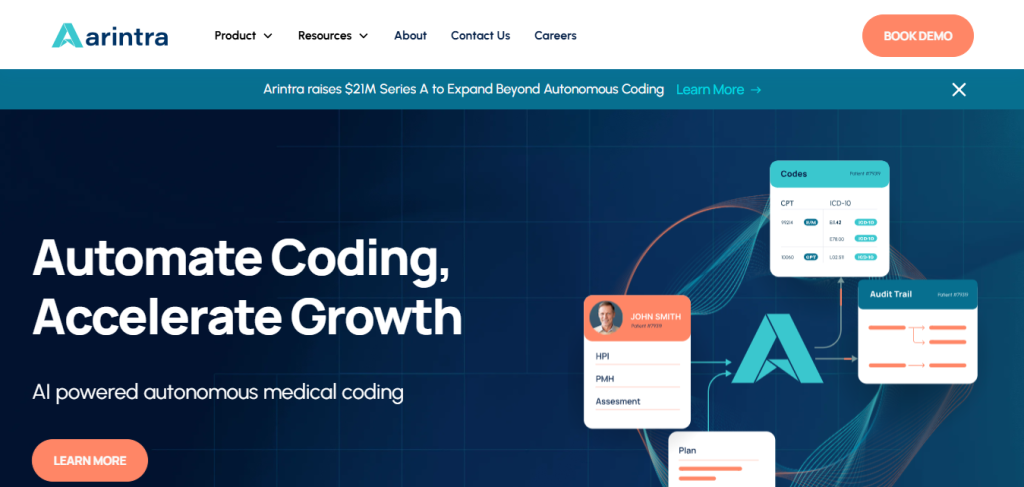Arintra Secures $21 Million Series A to Transform Healthcare with AI
August 31, 2025
byFenoms Startup Research

Arintra, a rising force in the healthcare AI space, has successfully raised $21 million in Series A funding to accelerate its mission of reinventing medical documentation and decision-making. The round was led by Peak XV Partners, with participation from Endeavor Health Ventures, Y Combinator, Counterpart Ventures, Spider Capital, TEN13, and other strategic investors.
Founded by Nitesh Shroff, Arintra is building AI-first solutions designed to ease the burden of medical documentation, reduce errors, and give clinicians more time to focus on patients. This funding milestone marks a pivotal moment for the company, positioning it as one of the most ambitious startups shaping the future of healthcare AI.
The Product: AI That Understands Healthcare
Healthcare professionals face overwhelming administrative workloads, often spending hours on documentation rather than patient care. Arintra addresses this problem by using AI-powered medical scribing and documentation tools that automatically capture patient interactions, structure them into clinical notes, and integrate seamlessly into hospital systems.
Key features of Arintra’s platform include:
- Real-time clinical note generation to reduce physician burnout.
- Automated coding and billing support, ensuring compliance and reducing claim errors.
- Seamless EHR integration, minimizing workflow disruptions.
- Predictive analytics to support clinical decision-making and improve outcomes.
This is more than efficiency—it’s about reshaping the clinician experience so healthcare systems can deliver both better care and better economics.
Why This Matters Now
The healthcare industry is under intense pressure. Global shortages of clinicians, rising patient volumes, and skyrocketing administrative costs are creating systemic inefficiencies. According to AMA research, U.S. physicians spend an average of 16 minutes per patient on electronic health record (EHR) documentation, leading to burnout and reduced capacity.
The AI in healthcare market is responding. Valued at $20.9 billion in 2024, it is projected to reach $187 billion by 2030, growing at a 37% CAGR. AI-driven documentation tools like Arintra are at the center of this wave, with analysts predicting that by 2026, 70% of hospitals will integrate AI scribes and automation platforms into their workflows.
What sets Arintra apart is its ability to move beyond generic AI into domain-specific intelligence that understands the complexity of healthcare. And here lies a deeper lesson for founders: the fastest way to dominate a market isn’t by building the most glamorous product—it’s by eliminating the costliest friction. Healthcare didn’t need another wearable or app; it needed someone to fix documentation, the silent tax on every provider’s time and energy. By tackling this bottleneck, Arintra isn’t just innovating—it’s unlocking capacity across the entire system. For founders, this highlights a critical truth: if you can identify the choke point in an industry and remove it, you don’t just create value—you control the flow of value itself.
Industry Outlook: AI in Healthcare Documentation
The future of healthcare is digital-first, and documentation automation is poised to be a core driver. Some critical projections include:
- Global Market Growth: AI in clinical documentation is expected to grow at over 40% CAGR through 2030.
- Administrative Burden Reduction: Automating documentation could save the U.S. healthcare system $100 billion annually by reducing administrative overhead.
- Burnout Mitigation: Studies show that 63% of clinicians experience burnout, with paperwork as the leading factor. AI-powered automation could cut documentation time by up to 50%.
- Compliance & Billing: By reducing coding errors, AI-driven documentation could improve revenue capture for hospitals by 10–15%.
Arintra is entering the market at precisely the right moment, offering solutions that address both the economic and human challenges of modern healthcare.
The Investor Edge
The caliber of Arintra’s investors underscores the scale of its potential.
- Peak XV Partners: A leading global venture firm with a track record of scaling transformative companies.
- Endeavor Health Ventures: Specialists in healthtech investments, providing both capital and strategic connections in healthcare.
- Y Combinator: The world’s most influential startup accelerator, known for backing unicorns in every industry.
- Counterpart Ventures, Spider Capital, TEN13: Strategic firms that add depth in SaaS scaling, enterprise adoption, and international expansion.
This backing equips Arintra with not just funding but strategic alignment across healthcare and technology ecosystems.
What’s Next for Arintra
With $21 million secured, Arintra will focus on:
- Scaling its platform to expand adoption among hospitals and healthcare networks.
- Investing in AI R&D to improve accuracy, compliance, and predictive capabilities.
- Building partnerships with leading health systems and insurers.
- Expanding globally, targeting regions where clinician shortages and administrative overhead are most acute.
Over the next 12–18 months, Arintra will aim to prove its model at scale, demonstrating not only improved clinician workflows but also measurable ROI for healthcare providers.
Final Thoughts
Arintra’s $21 million Series A raise isn’t just another funding story—it’s a signal that healthcare AI is moving from promise to implementation. By focusing on documentation and administrative pain points, Arintra is tackling one of the most pressing inefficiencies in modern medicine.
For the startup ecosystem, the lesson is powerful: the biggest opportunities often hide in the least glamorous problems. Founders who learn to solve these bottlenecks position themselves not just as players in the market—but as indispensable infrastructure for entire industries.









